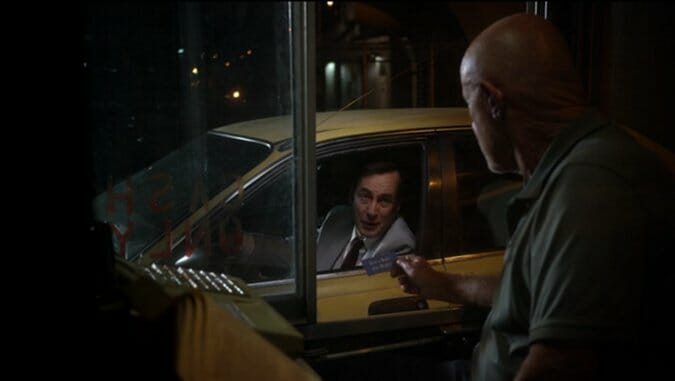Better Call Saul: “Alpine Shepherd Boy” (Episode 1.05)

Note: Mr. Josh Jackson is off this week, so I’ll be writing the review all by lonesome. We will return to your regularly scheduled epistolary programming next week.
I’m giving this episode a flat 5.0 for a specific reason—I can’t really drum up any emotion, positive or negative. On one hand, I wasn’t exactly bored watching “Alpine Shepherd Boy.” I kept watching without protest, but if it sounds like I’m damning with faint praise, well, you’re right. Because the flip side of this tepid endorsement is that if you had stopped the episode halfway through and told me I wasn’t allowed to finish it—EVER!—that would have been okay too. Better Call Saul came with a lot of hype from its parent show, Breaking Bad, but the modern audience is flighty and noncommittal, and the question Vince Gilligan and his writers have to answer, as the show enters the second half of its first season, is why anyone should bother to stay on this ship. The fact that it’s vaguely entertaining is not answer, and maybe the question should be re-phrased more directly: What is your show about? Or, to try a third time: Why is your show about the shit it should not be about?
(An illustrative point: Josh and I review this show every week, and we both literally forgot about it last night, which is why this piece is coming out on Monday afternoon instead of Monday morning. Josh and I also review The Walking Dead and Game of Thrones, and we tackled the last season of Breaking Bad, too. Ask me how many times we actually forgot one of those shows was airing—the answer is zero. When you write about this stuff on a regular basis, you don’t forget about shows that matter.)
But let’s start with the high points. After last week billboard stunt, McGill has attracted a series of oddball clients. The first is a crazy libertarian businessman who wants to secede from the United States, and when he offers McGill a million dollars for his services in fighting the government, it looks for a moment like the day struggle are over. This leads to a truly hilarious punchline: The man wants to pay McGill in the currency of his future sovereign nation. Next, a shiny, smiling, string-tight man has invented a toilet that offers encouragement to children trying to potty train. The problem is that the phrases he’s programmed—”you’re so big” and “give it to me”—are disturbingly sexual. I think I was more skewed out than amused when I actually watched this scene, but as I write it down now, it strikes me as pretty funny. Finally, McGill finds a niche in “elder law”—drawing up wills for dying people, which is so obviously unsustainable for a man of his temperament that it manages to be entertaining by contrast, especially when he purposefully dresses in the double-breasted style of Matlock to earn their trust, and advertises at the bottom of jello containers sold in nursing homes.
-

-

-

-

-

-

-

-

-

-

-

-

-

-

-

-

-

-

-

-

-

-

-

-

-

-

-

-

-

-

-

-

-

-

-

-

-

-

-

-








































